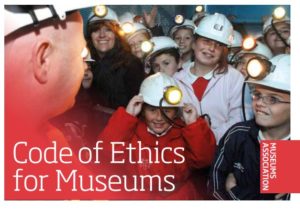Everyday Ethics for the Museum Sector
Posted on: April 25, 2016 by Emily Gould
The launch event for the new Museums Code of Ethics took place at the Wellcome Collection last Friday, 22nd April. You would be forgiven for thinking that a Friday afternoon event to explore an ethics code might not be the greatest crowd-puller; but on this occasion, you’d be much mistaken. Almost 150 delegates came to hear the Museums Association Director, Sharon Heal, introduce the new Code, to quiz an engaging and varied panel on ethical issues and to take part in lively and fascinating debate about the ethical dilemmas museums staff face on a daily basis.
The take-away messages about the new Code are that:
- It is based around the three key principles of public engagement and public benefit; stewardship of collections; and individual and institutional integrity.
- It is succinct and in plain English – a ‘bite-size’ version of its predecessors.
- It is a living document, not a tool of last resort, a fate to which earlier versions have been consigned. The Museums Association (MA) is keen for the sector to share feedback and case studies, good and bad, on an ongoing basis.
The panel* led debate on a number of very topical issues, with delegates keen to seek their views on a wide range of ethical dilemmas from restitution cases to commercial sponsorship. On both of these issues, and indeed, many others, the strong consensus was that openness and transparency are key. Museums were urged to engage stakeholders in the debate.
Another theme which underlay much of the discussion was the need to treat each situation on its merits. The response to questions of ethics can never be a ‘one-size-fits-all’ as was clearly shown by the case studies the panellists shared about their institutions’ relationships with sponsors. This is always a tricky area and a PR minefield as many leading institutions have experienced in recent times in their partnerships with energy companies.
Sharon Heal commented in her opening address that the new Code was meant to encompass a spirit of ‘everyday ethics’. As discussions progressed through the afternoon, it became abundantly clear that ethical questions are, indeed, increasingly central to life in the museums sector. We look forward to seeing the impact of the new Code and tracking its evolution as a living framework to guide the sector through the ethical questions of the day.
The panel comprised Guardian journalist, Maev Kennedy, Director of the Imperial War Museum, Di Lees, MA Ethics Committee Chair, Rowan Brown, and Wellcome Trust Director of Culture and Society, Simon Chaplin.
